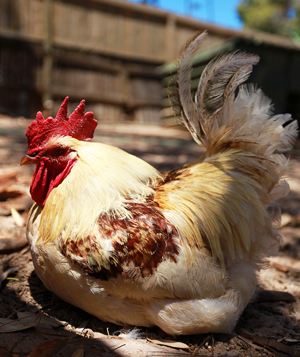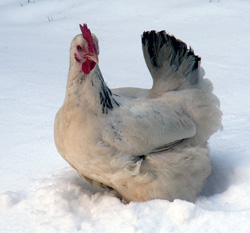When you’re looking for plans for chicken coops there are a few considerations that are obvious: space so your hens aren’t cramped, protection so they’re safe, and light, because light conditions regulate their laying. There are few other things that are often an afterthought, but are a vitally important part of good chicken coop designs.
 The first is air flow. Ventilation if you like. If you’ve ever been passed a big commercial chicken farm, chances are you knew it about half a mile before and some considerable time after. Now I’m as big a fan of chickens as anyone else, but if there’s not enough air flow provided by your chicken coop plans, those ladies are going to smell. Hey, it’s not their fault, they perspire like the rest of us and they’ve got a need to go to the toilet too! Sadly chickens can’t get out a can of air freshener so we have to give them all the help we can. Of course in winter you still want them to be snug and warm so in an ideal world you want designs for chicken coops that incorporate vents or windows that you can open when it’s hot. It’s best to have these on a side that isn’t into the prevailing wind. Those ladies like a refreshing breeze – not a nasty draught up their… feathers.
The first is air flow. Ventilation if you like. If you’ve ever been passed a big commercial chicken farm, chances are you knew it about half a mile before and some considerable time after. Now I’m as big a fan of chickens as anyone else, but if there’s not enough air flow provided by your chicken coop plans, those ladies are going to smell. Hey, it’s not their fault, they perspire like the rest of us and they’ve got a need to go to the toilet too! Sadly chickens can’t get out a can of air freshener so we have to give them all the help we can. Of course in winter you still want them to be snug and warm so in an ideal world you want designs for chicken coops that incorporate vents or windows that you can open when it’s hot. It’s best to have these on a side that isn’t into the prevailing wind. Those ladies like a refreshing breeze – not a nasty draught up their… feathers.
Second, perches. Chickens will perch pretty much anywhere, so you might wonder why you need to consider perch position when checking out plans for chicken coops. Actually the point is to encourage them not to perch anywhere they like – because they’ll invariably choose places that you don’t want – like feeders, water bowls, nest boxes. You might not think that’s a problem, but to put it delicately, chickens don’t move off their perch to go to the toilet. Anything underneath gets covered in droppings. If you keep chickens, dropping are something you’ve got to get used to but you don’t want them in the feed, water or nest boxes if you can help it. No solution is perfect, but this will minimize the problem. A final point about perches – make sure there’s plenty of space for everyone otherwise you could get “pecking order” problems.
Third, nest boxes. You’ll be amazed the number of chicken coops I’ve seen without nest boxes. Sure, the birds will lay in straw on the floor, but if they don’t have somewhere they consider “right” to lay, and they’ve got access to the great outdoors, they’ll go and lay in a barn, or hedge, or under a car… They don’t need fancy individual “nests” (although you can if you like), it’s sufficient to have boxes that can take several hens so long as they are deep enough (four to six inches) and filled with wood shavings or straw. It’s unlikely your hens will sleep in them – they normally prefer to perch – but they should be discouraged from doing so because they’ll dirty the eggs. It’s not a major problem, just better avoided.
So there you go, a few details when you’re looking for plans for chicken coops that will just make sure the job is finished off nicely and those lovely ladies are as happy as could be. Happy hens give tastier eggs you know!

 I know, it’s only late June, but you need to plan ahead right? Well anyway, it was on my mind so there you are. You can always come back and read this again when the frosts arrive 😉
I know, it’s only late June, but you need to plan ahead right? Well anyway, it was on my mind so there you are. You can always come back and read this again when the frosts arrive 😉 Hi there, welcome to Best Plans For Chicken Coops!
Hi there, welcome to Best Plans For Chicken Coops!